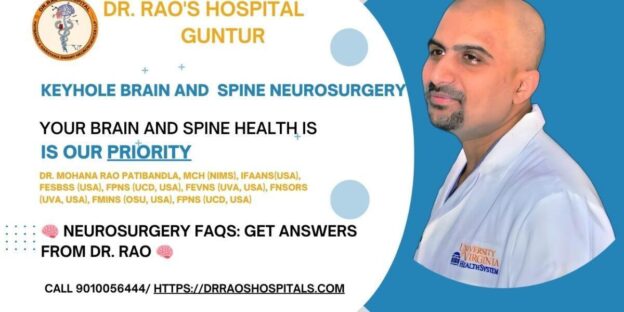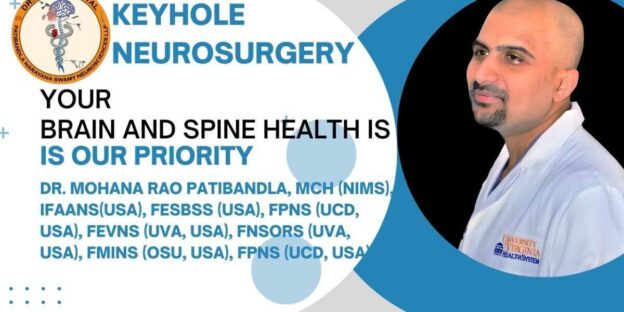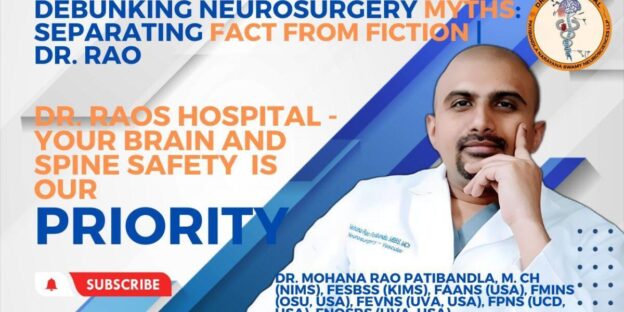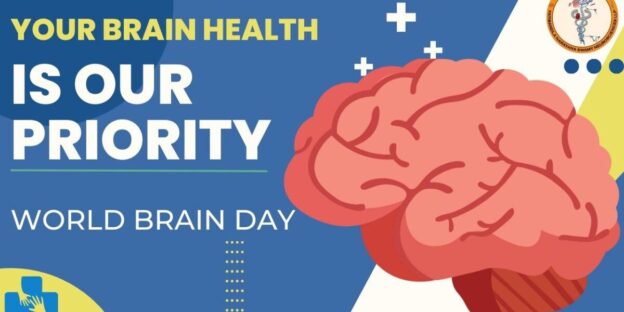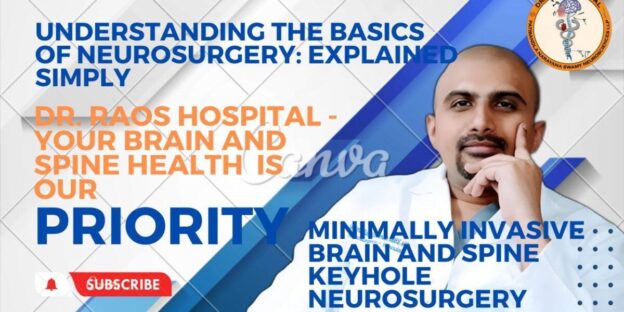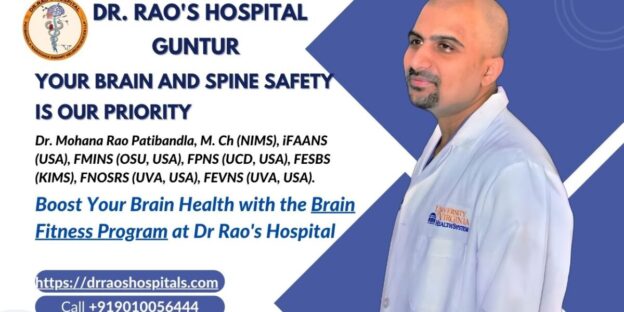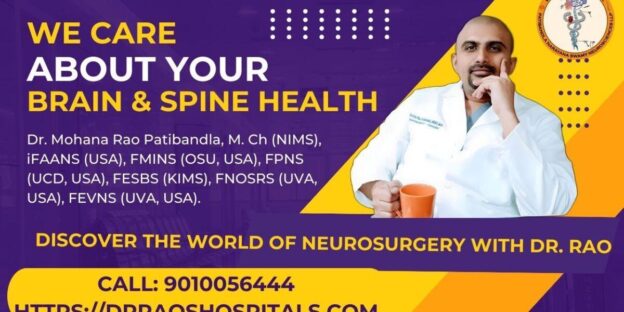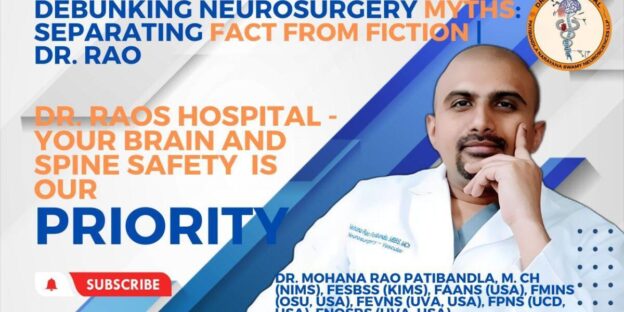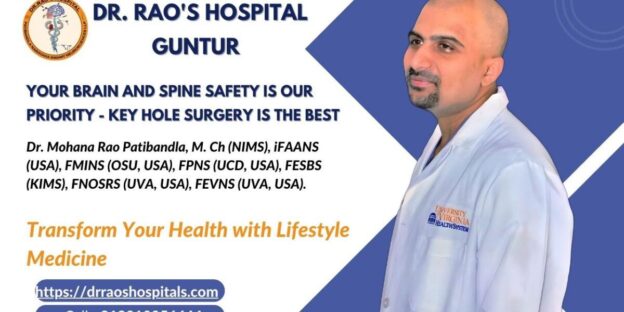Summary: Join Dr. Rao, the leading neurosurgeon, in a compelling Q&A session that uncovers the world of minimally invasive neurosurgery and spine surgery. Gain valuable insights into the advantages of these advanced techniques and their transformative impact on patient’s lives.
FAQs of Keyhole Neurosurgery and Spine Surgery by the best Neurosurgeon, Dr. Rao
- What are minimally invasive neurosurgery and spine surgery?
- Minimally invasive neurosurgery and spine surgery are surgical techniques that use small incisions, specialized instruments, and advanced imaging to access and treat various brain, spine, and nerve conditions. Compared to traditional open surgery, these techniques aim to reduce damage to the surrounding tissues, blood loss, infection risk, pain, and recovery time.
- What are the advantages of minimally invasive neurosurgery and spine surgery?
- Some of the advantages of minimally invasive neurosurgery and spine surgery are: better cosmetic results from more minor scars, less blood loss and transfusion need, less muscle damage and inflammation, less postoperative pain and medication use, faster recovery and return to normal activities, shorter hospital stay and lower cost, lower risk of infection and complications.
- What are the disadvantages or limitations of minimally invasive neurosurgery and spine surgery?
- Some of the disadvantages or limitations of minimally invasive neurosurgery and spine surgery are more incredible technical difficulty and learning curve for the surgeon, longer operative time in some cases, limited visualization and access to some areas of the brain or spine, higher cost of equipment and instruments, the potential need for conversion to open surgery in case of complications or failure.
- What conditions can be treated with minimally invasive neurosurgery and spine surgery?
- Some of the conditions that can be treated with minimally invasive neurosurgery and spine surgery are: brain tumors, aneurysms, hydrocephalus, trigeminal neuralgia, pituitary tumors, skull base tumors, spinal stenosis, herniated discs, degenerative disc disease, spinal deformities such as scoliosis or spondylolisthesis, spinal fractures, spinal infections, spinal tumors.
- How is minimally invasive neurosurgery and spine surgery performed?
- Minimally invasive neurosurgery and spine surgery can be performed using different techniques depending on the condition and location. Some of the standard techniques are: using a tubular retractor to create a small tunnel through the muscles and soft tissues to reach the spine or brain; using an endoscope or microscope to visualize the surgical site through a small incision; using a robot or navigation system to guide the instruments and implants with high precision; using lasers or radiofrequency to ablate or coagulate tissues.
- Who is a candidate for minimally invasive neurosurgery and spine surgery?
- Not every patient or condition is suitable for minimally invasive neurosurgery and spine surgery. The decision depends on several factors, such as the type, size, location, and severity of the condition; the patient’s age, health status, medical history, and preferences; the surgeon’s experience, skills, and equipment availability. The best way to determine if you are a candidate for minimally invasive neurosurgery and spine surgery is to consult a qualified neurosurgeon who can evaluate your condition and discuss your options.
- What are the risks or complications of minimally invasive neurosurgery and spine surgery?
- As with any surgical procedure, minimally invasive neurosurgery and spine surgery have some risks or complications that may occur during or after the operation. Some possible risks or complications are bleeding, infection, nerve damage, spinal cord injury, cerebrospinal fluid leak, implant failure or migration, hardware malfunction or breakage, and recurrence or progression of the condition.
- What is the recovery process after minimally invasive neurosurgery and spine surgery?
- The recovery process after minimally invasive neurosurgery and spine surgery varies depending on the type and extent of the surgery. In general, patients can expect to have less pain and discomfort than after open surgery. They may also be able to resume their normal activities sooner. However, they still need to follow some instructions from their surgeon, such as: taking prescribed medications for pain relief and infection prevention; keeping the incision site clean and dry; avoiding strenuous activities such as lifting heavy objects or bending; wearing a brace or collar if needed; attending physical therapy sessions if recommended; following up with their surgeon regularly.
- How do I choose a good neurosurgeon for minimally invasive neurosurgery and spine surgery?
- Choosing a good neurosurgeon for minimally invasive neurosurgery and spine surgery is an important decision that can affect your outcome. It would be best if you are looking for a neurosurgeon who has: board certification in neurological surgery; fellowship training in minimally invasive neurosurgery or spine surgery; experience in performing the specific procedure you need; access to advanced equipment and facilities; good reputation and reviews from previous patients; good communication and rapport with you.
- What are some myths and facts about minimally invasive neurosurgery and spine surgery?
- Some of the common myths and facts about minimally invasive neurosurgery and spine surgery are:
- Myth: Minimally invasive neurosurgery and spine surgery are experimental or unproven.
- Fact: Minimally invasive neurosurgery and spine surgery have been developed and refined over the past decades and proven safe and effective for many conditions. They are supported by scientific evidence and clinical guidelines.
- Myth: Minimally invasive neurosurgery and spine surgery can treat any condition or patient.
- Fact: Minimally invasive neurosurgery and spine surgery are unsuitable for every condition or patient. Some conditions may require open surgery or a combination of techniques. Some patients may have contraindications or preferences that prevent them from undergoing minimally invasive neurosurgery and spine surgery.
- Myth: Minimally invasive neurosurgery and spine surgery have no risks or complications.
- Fact: Minimally invasive neurosurgery and spine surgery have lower risks and complications than open surgery but are not risk-free. They still involve cutting, drilling, implanting, or ablating tissues that can cause bleeding, infection, nerve damage, or other problems. Patients should be aware of the potential risks and complications and discuss them with their surgeon before the surgery.
- Myth: Minimally invasive neurosurgery and spine surgery guarantee a quick and easy recovery.
- Fact: Minimally invasive neurosurgery and spine surgery can shorten the recovery time and reduce the pain and discomfort after the surgery, but they do not eliminate them. Patients still need to follow their surgeon’s instructions, take medications, avoid certain activities, wear braces or collars, attend physical therapy, and follow up with their surgeon. The recovery process also depends on the patient’s condition, health status, age, and lifestyle.
- Why choose Dr. Rao’s hospital for minimally invasive neurosurgery and spine surgery?
- Choosing Dr. Rao’s Hospital for Minimally Invasive Neurosurgery and Spine Surgery
- Expertise: Dr. Rao’s Hospital boasts a team of highly skilled and experienced neurosurgeons led by Dr. Mohana Rao Patibandla, a renowned neurosurgeon with expertise in minimally invasive techniques.
- Minimally Invasive Approach: The hospital specializes in minimally invasive neurosurgery and spine surgery, which offer smaller incisions, reduced scarring, quicker recovery, and less post-operative pain compared to traditional open surgeries.
- Advanced Technology: Dr. Rao’s Hospital has state-of-the-art technology and cutting-edge equipment to perform minimally invasive procedures with precision and accuracy.
- Comprehensive Care: The hospital provides comprehensive care for patients with various neurological conditions, including spine disorders, brain tumors, epilepsy, and more.
- Personalized Treatment: Each patient’s condition is thoroughly evaluated, and treatment plans are customized to meet individual needs, ensuring the best possible outcomes.
- High Success Rates: Dr. Rao’s Hospital has a proven track record of successful outcomes in minimally invasive neurosurgery and spine surgery, making it a trusted choice for patients seeking effective treatments.
- Multidisciplinary Team: The hospital has a multidisciplinary team of specialists, including neurologists, radiologists, and physical therapists, working together to provide comprehensive care throughout the patient’s journey.
- Patient-Centric Approach: Dr. Rao’s Hospital strongly emphasizes patient satisfaction, ensuring patients receive compassionate care and support throughout their treatment process.
- Holistic Care: The hospital believes in a holistic approach to treatment, addressing not only the physical aspects of the condition but also the emotional and psychological well-being.
- Accredited Facility: Dr. Rao’s Hospital is a reputable and accredited healthcare facility, adhering to the highest quality and patient safety standards.
- International Patients: The hospital has experience treating international patients and assists with travel, accommodation, and language translation services.
- Positive Reviews: Dr. Rao’s Hospital has garnered positive reviews and testimonials from satisfied patients who have experienced successful outcomes under their care.
- Dr. Rao’s Hospital is a leading choice for minimally invasive neurosurgery and spine surgery due to its expertise, advanced technology, personalized care, and high success rates. With a patient-centric approach and a dedicated team of specialists, the hospital provides comprehensive and effective treatment options for patients seeking relief from neurological conditions.


